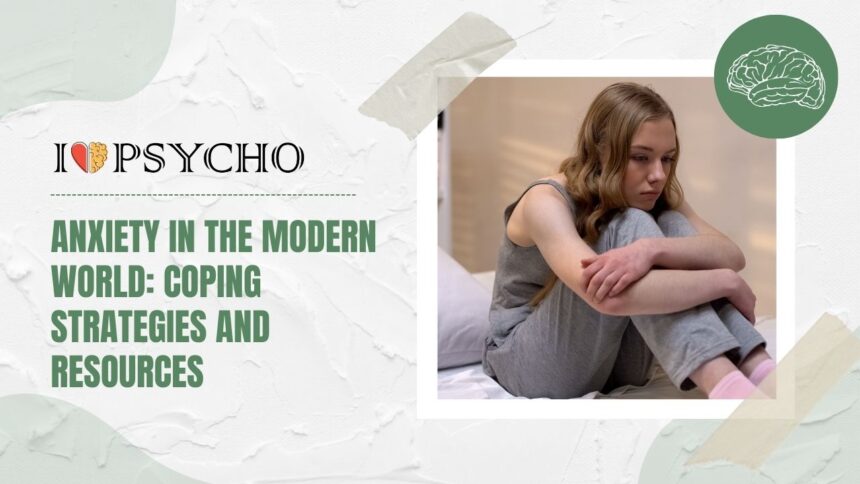Anxiety. A word that holds more weight in today’s fast-paced world than ever before. From the constant buzz of notifications to the pressures of juggling work, family, and personal life, it’s no wonder anxiety has become a common companion for many. But fret not; this blog is here to shed light on understanding anxiety in the modern world and provide you with practical coping strategies and resources to navigate through its murky waters. So, grab a cup of tea, cozy up, and let’s dive into the realm of managing anxiety like a pro!
Understanding Anxiety in the Modern World
In the hustle and bustle of our digital age, anxiety has solidified its place as a prevalent issue. It’s like a shadow that looms over many, triggered by the demands and uncertainties of modern life. From social media comparisons to work deadlines looming overhead, anxiety can strike at any moment, leaving us feeling overwhelmed and on edge.
The fast-paced nature of today’s world often leaves little room for rest or relaxation, fueling the flames of anxiety further. The constant bombardment of information and stimuli can easily tip the scales from manageable stress to a full-blown anxiety attack in no time.
Understanding how these external factors intertwine with our internal responses is key to tackling anxiety head-on. By unraveling the complexities behind what triggers our anxious thoughts and feelings, we can begin to take steps towards regaining control over our mental well-being.
Common Triggers and Causes of Anxiety
In today’s fast-paced world, anxiety can stem from a variety of triggers and causes. One common factor is the pressure to constantly perform and meet high expectations, whether in work or personal life. The fear of failure or not measuring up to societal standards can be overwhelming.
Another trigger for anxiety is the constant exposure to stress-inducing situations like financial instability, relationship issues, or health concerns. These external factors can create a sense of uncertainty and unease that fuels anxious thoughts.
Moreover, past traumatic experiences or unresolved emotional baggage can manifest as anxiety in the present moment. Unprocessed emotions have a way of resurfacing when triggered by certain events or circumstances.
Additionally, genetics and brain chemistry play a role in predisposing individuals to anxiety disorders. Imbalances in neurotransmitters like serotonin and dopamine may contribute to heightened feelings of anxiousness.
By recognizing these common triggers and causes of anxiety, individuals can begin to understand their own struggles better and seek appropriate support and coping mechanisms.
The Power of Mindfulness and Meditation
In a fast-paced world filled with constant distractions and stressors, the power of mindfulness and meditation cannot be overstated. These practices offer a sanctuary for the mind, allowing individuals to find peace amidst the chaos. By focusing on the present moment without judgment, mindfulness helps in reducing anxiety and promoting mental clarity.
Meditation, on the other hand, provides a deeper dive into self-awareness and introspection. It allows one to observe their thoughts without getting entangled in them, fostering emotional resilience and inner balance. Regular practice of mindfulness and meditation can rewire the brain’s neural pathways, leading to improved focus, creativity, and overall well-being.
Whether it’s taking a few minutes each day to breathe deeply or participating in guided meditation sessions, incorporating these practices into your routine can have profound effects on your mental health. Embracing mindfulness and meditation is not about escaping reality but rather finding solace within yourself amidst life’s uncertainties.
Support Systems and Resources for Anxiety
Navigating anxiety can feel overwhelming, but you don’t have to face it alone. Support systems play a crucial role in managing anxiety and promoting well-being. Connecting with understanding friends or family members can provide comfort and reassurance during tough times.
In addition to personal relationships, there are various resources available for those dealing with anxiety. Online support groups offer a sense of community and solidarity with others who understand what you’re going through. Sharing experiences and coping strategies can be incredibly beneficial in feeling less isolated.
Hotlines and helplines provide immediate assistance for individuals in distress, offering a listening ear and valuable guidance. These services are confidential and accessible 24/7, ensuring help is always within reach when needed most.
Mental health apps have also become popular tools for managing anxiety symptoms through features like guided meditation, mood tracking, and relaxation techniques. Experimenting with different apps can help find what works best for your unique needs.
Breaking the Stigma of Mental Health
Breaking the stigma of mental health is a crucial step towards creating a more compassionate and understanding society. It involves challenging stereotypes and misconceptions surrounding mental illness, promoting open conversations, and fostering acceptance for those struggling with their mental well-being.
By sharing personal stories and experiences, we can humanize mental health issues and show that seeking help is a sign of strength, not weakness. Education plays a key role in dispelling myths about mental illnesses and encouraging empathy towards individuals facing these challenges.
Creating safe spaces where people feel comfortable discussing their emotions without fear of judgment is essential in normalizing discussions around mental health. It’s important to remember that everyone’s journey with mental health is unique, and support should always be offered without stigma or discrimination.
Together, through advocacy efforts, community outreach programs, and individual acts of kindness, we can work towards breaking down barriers that prevent individuals from seeking the help they need to thrive mentally and emotionally.
Common Symptoms of Anxiety
Anxiety manifests in various ways, affecting individuals both mentally and physically. One common symptom is persistent worrying or feeling on edge without a specific cause. This constant state of unease can be overwhelming for those experiencing it daily.
Physical symptoms such as increased heart rate, sweating, trembling, and shallow breathing are also prevalent among individuals with anxiety. These bodily reactions are the body’s way of responding to perceived threats or dangers.
Difficulty concentrating or racing thoughts are other signs of anxiety that can interfere with daily tasks and decision-making processes. Individuals may find themselves unable to focus due to their mind being preoccupied with worry and fear.
Insomnia or disrupted sleep patterns often accompany anxiety disorders, making it challenging for individuals to get restful sleep at night. The lack of adequate rest can further exacerbate feelings of anxiousness during the day.
Recognizing these common symptoms is crucial in seeking help and support for managing anxiety effectively before it escalates into more severe mental health issues.
Coping Strategies for Managing Anxiety:
When it comes to managing anxiety, there are various coping strategies that can help you navigate through challenging times. One effective method is practicing mindfulness and meditation. Taking a few moments each day to center yourself and focus on the present can significantly reduce feelings of stress and worry.
Engaging in regular exercise and physical activity is another powerful way to alleviate anxiety symptoms. Whether it’s going for a walk, doing yoga, or hitting the gym, movement releases endorphins that boost your mood and overall well-being.
Maintaining healthy eating habits also plays a crucial role in managing anxiety. Consuming nutritious foods like fruits, vegetables, whole grains, and lean proteins can support your mental health by providing essential nutrients that promote brain function.
Seeking therapy or counseling from trained professionals can provide valuable tools and techniques to cope with anxiety effectively. Talking about your feelings in a safe space with someone who understands can offer insights and strategies for overcoming challenges.
By incorporating these coping strategies into your daily routine, you can proactively manage anxiety levels and improve your overall quality of life. Remember that everyone’s journey is unique, so find what works best for you to cultivate inner peace and resilience against anxiety triggers.
A. Mindfulness and Meditation
In the fast-paced world we live in, finding moments of stillness can be a challenge. Mindfulness and meditation offer a sanctuary from the chaos, allowing us to tune into the present moment. By focusing on our breath or sensations, we cultivate awareness and calm within ourselves.
Meditation doesn’t have to mean sitting cross-legged for hours; even just a few minutes of focused breathing can make a difference. It’s about training our minds to let go of worries and be fully present.
Research shows that mindfulness practices can reduce anxiety levels and improve overall well-being. Through regular practice, we learn to observe our thoughts without judgment, creating space between ourselves and our emotions.
Whether it’s through guided meditations or silent reflection, integrating mindfulness into daily life can help us navigate stressors with greater ease. Take time each day to pause, breathe, and reconnect with yourself amidst the hustle and bustle of modern life.
B. Exercise and Physical Activity
In the hustle and bustle of modern life, finding time to prioritize exercise and physical activity can seem challenging. However, incorporating movement into your daily routine can be a game-changer when it comes to managing anxiety.
Whether it’s going for a brisk walk in nature, hitting the gym for a workout session, or practicing yoga at home, physical activity releases endorphins that uplift your mood and reduce stress levels. Even just a short burst of exercise can make a noticeable difference in how you feel.
Engaging in regular physical activity not only benefits your physical health but also plays a significant role in improving your mental well-being. It provides an outlet to release pent-up energy and tension while promoting relaxation and better sleep quality.
So next time you’re feeling overwhelmed by anxiety, consider lacing up your sneakers or rolling out your yoga mat for some much-needed movement therapy. Your body and mind will thank you for it!
C. Healthy Eating Habits
Maintaining healthy eating habits is crucial for managing anxiety in the modern world. Consuming a balanced diet rich in fruits, vegetables, whole grains, and lean proteins can positively impact mental well-being. Foods high in sugar and processed ingredients may exacerbate feelings of stress and anxiety.
Incorporating omega-3 fatty acids found in fish, nuts, and seeds can help reduce inflammation in the brain linked to anxiety. Avoiding excessive caffeine intake and alcohol consumption is also important as they can trigger or worsen symptoms of anxiety.
Eating regular meals throughout the day can stabilize blood sugar levels, preventing mood swings that may contribute to feelings of unease. Hydrating adequately with water is essential for overall health and can aid in reducing symptoms of anxiety.
Experimenting with mindful eating practices such as focusing on each bite without distractions can promote a greater connection between food intake and emotional well-being. Prioritizing nutritious choices not only nurtures the body but also supports a more balanced state of mind.
D. Therapy and Counseling
Therapy and counseling are valuable tools in managing anxiety in the modern world. Speaking to a trained professional can provide insights into your thoughts and behaviors, helping you navigate through challenging emotions. Therapy offers a safe space to express yourself without judgment, allowing for personal growth and self-discovery.
Counseling sessions can equip you with coping strategies tailored to your individual needs, empowering you to confront anxiety triggers head-on. A therapist can help you identify negative thinking patterns and replace them with healthier perspectives, fostering a more positive outlook on life.
Through therapy, you learn effective communication skills that enhance relationships and reduce interpersonal stressors. It’s important to remember that seeking help is not a sign of weakness but rather a courageous step towards improving your mental well-being.
Incorporating therapy or counseling into your anxiety management plan can be transformative, offering long-lasting benefits for your overall health and happiness.
Utilizing Resources for Support:
When facing anxiety, it’s crucial to remember that you’re not alone. There are resources available to support you during difficult times. Online support groups can provide a sense of community and understanding from individuals going through similar experiences.
Hotlines and helplines offer immediate assistance for those in crisis or needing someone to talk to. These services can be a lifeline when feeling overwhelmed by anxiety. Additionally, mental health apps have become increasingly popular tools for managing stress and tracking moods.
Whether it’s connecting with others virtually, speaking with trained professionals over the phone, or utilizing technology for mental wellness, there are various ways to access support. Remember that seeking help is a sign of strength, and reaching out can make a significant difference in your journey towards managing anxiety effectively.
A. Online Support Groups
In today’s digital age, online support groups have become a valuable resource for those dealing with anxiety. Connecting with others who understand what you’re going through can provide a sense of community and belonging that is essential in managing anxiety.
These virtual spaces offer a safe environment to share experiences, seek advice, and receive support from individuals who may be miles away but can relate to your struggles on a personal level. The anonymity provided by online platforms can also make it easier for some people to open up about their feelings without fear of judgment.
Whether it’s through dedicated forums, social media groups, or specialized websites, the availability of online support groups means that help is just a few clicks away. Being able to connect with like-minded individuals in real-time can make a significant difference in how you cope with anxiety on a day-to-day basis.
Remember, reaching out for support is not a sign of weakness but rather an act of strength. Embracing the power of online communities can be an empowering step towards managing your anxiety more effectively.
B. Hotlines and Helplines
Struggling with anxiety can make you feel isolated, but remember, you are never alone. Hotlines and helplines provide immediate support from trained professionals who understand what you’re going through. When those anxious thoughts start to overwhelm you, reaching out for help can be a game-changer.
These services offer a safe space to talk about your feelings without judgment. Whether it’s the middle of the night or during a hectic day, helplines are available 24/7 to listen and provide guidance. Sometimes just having someone to listen can make all the difference in managing your anxiety.
Don’t hesitate to save these numbers in your phone or write them down where you can easily access them when needed. It’s okay not to have all the answers yourself – that’s why these hotlines exist, so take advantage of their support whenever necessary.
C. Mental Health Apps
In today’s fast-paced world, technology has made mental health resources more accessible than ever. Mental health apps are revolutionizing the way individuals can manage their anxiety on-the-go. These apps offer a variety of features such as guided meditation sessions, mood tracking tools, and coping techniques to help users navigate through stressful moments.
With just a few taps on your smartphone, you can access a virtual support system right in the palm of your hand. Whether you’re feeling overwhelmed or just need a moment of calm, these apps provide personalized strategies to tackle anxiety in real-time. Some even offer breathing exercises and relaxation techniques to promote mindfulness and reduce stress levels instantly.
By incorporating mental health apps into your daily routine, you can take proactive steps towards improving your overall well-being. The convenience and anonymity they provide make seeking help easier for those who may feel hesitant about traditional therapy options. So why not give one a try today?
Conclusion
In a world where anxiety is becoming increasingly prevalent, it’s crucial to understand the triggers, causes, and symptoms associated with this mental health condition. Mindfulness, meditation, exercise, healthy eating habits, therapy, and counseling are powerful tools that individuals can utilize to manage their anxiety effectively.
Support systems such as online groups, hotlines and helplines, as well as mental health apps offer valuable resources for those struggling with anxiety. Breaking the stigma surrounding mental health is essential in creating a safe environment for individuals to seek help without fear of judgment.
By implementing coping strategies and utilizing available resources for support, individuals can navigate through the challenges of managing anxiety in the modern world. Remember that seeking help is a sign of strength, not weakness. Together we can work towards promoting mental well-being and supporting each other on our journey towards better mental health.









